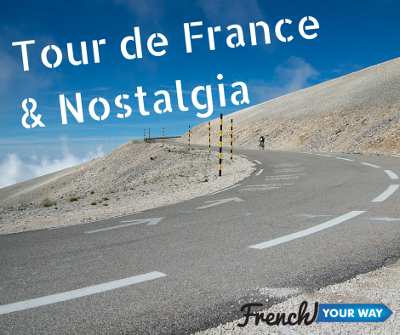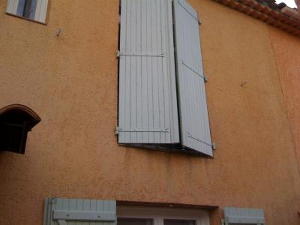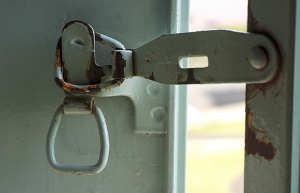
My photo from Mont Ventoux, France
This article is a bit different! This time, I wrote in French and in English, to give you some guided reading, along with a few explanations on some French words and expressions 🙂
Let me know if you liked it in the comment section!
Bonne lecture! / Happy reading!
Tour de France et nostalgie / Tour de France and nostalgia
Suivez-vous le Tour de France ? Personnellement, je zyeute (1) l’écran à quelques occasions, luttant contre le sommeil (à cause de l’heure tardive de diffusion en Australie).
Do you follow the Tour de France ? Personally, I only glance at the screen every so often as I’m fighting against sleepiness (because of the late broadcasting time in Australia).
(1) « zieuter » ou « zyeuter » (fam) = regarder. This verb was made from the sound of « les yeux » (= « the eyes ») !
Regarder le Tour de France à la télévision fait remonter en moi des souvenirs d’enfance.
Watching the Tour de France on TV brings back childhood memories:
Quand j’étais petite, mon papa et moi regardions la course ensemble sur le petit écran (2). A cette époque, le climat n’était pas aussi déréglé qu’aujourd’hui et il faisait beau et chaud en été. Les volets de la maison restaient fermés à l’espagnolette (3) et nous passions donc les heures les plus chaudes de la journée dans la pénombre et la fraîcheur.
When I was little, my dad and I used to watch the race together on TV. Back then, the weather was not as crazy as it is now and in summer it used to be sunny and hot. The shutters of the house would remain half closed and so we would spend the hottest hours of the day in the shade and cool.
(2) le petit écran (= « the small screen ») = la télévision – as opposed to « le grand écran” (= « the big screen ») which is the other name for the cinema (as in the art, not the building !)
(3) Une fenêtre fermée à l’espagnolette is a window that is closed without being locked , meaning that it is closed while the two “battants” of the windows are not completely locked , one in the other so to speak, thus leaving a space in-between them, allowing air to go through.
Je n’ai plus de souvenir précis des courses elles-mêmes, mais ces après-midis étaient toujours très attendus car…nous mangions toujours un esquimau (4) à vanille enrobé de chocolat !
I don’t have specific memories about the races, but those afternoons were much longed for as… we would always have a chocolate coated vanilla ice cream on a stick!
(4) Esquimau : a patented brand name which now describes an ice-cream on a stick (ice lolly, popsicle)
Aujourd’hui, regarder le Tour de France depuis (5) l’étranger, c’est redécouvrir des paysages un peu oubliés mais toujours aussi spectaculaires. C’est aussi l’ambiance de la France en été que je ressens et qui me manque: l’atmosphère si particulière et indescriptible des grandes vacances (6), les lieux et villages imprégnés d’Histoire (7), les châteaux, les façades des maisons qui dont l’apparence change selon les régions… Je me souviens aussi de l’odeur des champs de blé fraîchement moissonnés, de la sensation du soleil sur la peau (pas aussi dur ni dangereux qu’en Australie), et du goût sucré du sirop à la menthe que j’adorais.
Today, watching the Tour from overseas allows me to rediscover sceneries somewhat forgotten but always very spectacular. I can also feel and miss the atmosphere of France during summer: the distinctive and indescribable feel of summer holidays, the places and villages filled with history, the castles, the houses the façade of which changes with the regions… I also remember the smell of the freshly harvested fields of wheat, the feel of the sun on my skin (not as hard and dangerous as in Australia) and the taste of the mint cordial which I loved.
(5) “depuis” in this context is used as a place preposition and means “from”. It’s not a time indicator.
(6) les grandes vacances = les vacances d’été.In France, the summer holidays are in July and August.
(7) With a capitalised “H”, the feminine noun “Histoire” means “history”, while with a small “h”, “histoire” means “story”.
Et vous, avez-vous des souvenirs d’enfance liés à un moment particulier de l’année ?
And you? Do you have childhood memories linked to a specific time of the year ?

